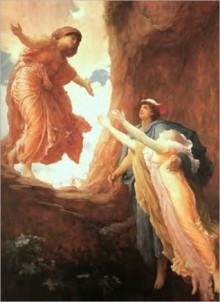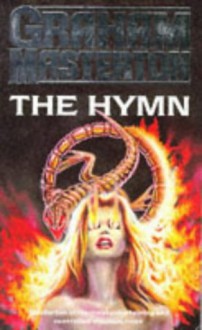
While the title of this poem is ‘The Hymn to Demeter’ and the poem is a part of a collection of poems referred to as the Homeric Hymns, a part of me feels that these titles are a little misleading, which is why I am more inclined to refer to this as a poem (or a song) as opposed to a hymn. First of all, having grown up in a Christian tradition my idea of a hymn is a song that is basically about how wonderful the Christian God (and in turn Jesus Christ) happens to be and is generally accompanied by an organ and a choral ode. Further, most of these songs tend to follow along the similar pattern of, well, Amazing Grace, which is basically a song about how John Newton (the composer) was this huge crook, but then he discovered that Jesus loved him and died for his sins, and all of the sudden everything was fine and dandy (despite the fact that he continued trading slaves).
The second problem that I have with the categorisation of it being a Homeric hymn is that it doesn’t feel like it was written by Homer. Okay, I would hardly call myself an expert on Homeric writings, and while I did study the Odyssey in the original language back at university I don’t sit in my sun room with a copy of the Greek text and a pot of tea, and casually read it (in fact the only book that I happen to read in Greek is the Bible, and that is usually when somebody is reading it aloud in English). However, despite my lack of authority, I still don’t believe that it was written by Homer – it just didn’t feel right. First of all the poem doesn’t take up 24 scrolls, nor does it go into explicit details of the surroundings and the people, nor does it break off into massive tangents. In fact the poem is actually quite self-contained (and pretty short as well). The other thing was that as I was reading it (though it may have more to do with the translation, which was pretty shocking by the way) it reminded me for some of the Ancient Babylonian texts that I had read in times past.
Actually, when I read a commentary on this poem, the explanation as to why it was considered a Homeric Hymn was not because they believed Homer wrote it but because tradition since the Roman times had attributed it to Homer. Actually, the whole debate over the attribution of these songs, as well as the Odyssey and the Iliad, to Homer has more to do with them being written down as opposed to composition. Actually, come to think of it, if Homer was blind as legend has it then it does make me wonder how he would have been able to write it down anyway (though no doubt he could still have been an oral poet). Well, being blind hasn’t stopped people from becoming famous poets in the past, as was the case with Milton, but that is beside the point. Anyway, the attribution to Homer, in my opinion, has more to do with the poems being written down from an oral tradition as opposed to the original composer.
I probably should actually start talking about the poem itself as opposed to the reasons as to why I don’t consider it a hymn, or having been composed by Homer. So, the story is about the Greek God Demeter, who happens to be the god of the harvests. Basically she is the one that makes sure all of the wheat grows so that nobody starves. Anyway she had a daughter by Zeus (who else – it seems that whenever a god, or a mortal, becomes pregnant, Zeus seems to have something to do with it, which makes me wonder whether this arose as an excuse for pregnant women to cover up infidelity) and one day Zeus sort of lets his brother Hades kidnap Demeter’s daughter and take her into the underworld to be his wife. The thing is that Demeter doesn’t know what happened to her daughter (Persephone), despite the fact that not only was Zeus well aware of this, but he basically feigned ignorance when asked. Mind you, despite the fact that most of the gods were being tight lipped about the whole event, not all of them were, and Demeter soon found out what happened. As a result he basically turned her back on Olympus and travelled to the city of Eleusis where she basically becomes a domestic servant.

The Ruins of Eleusis
The problem was that now that Demeter had left Olympus there wasn’t anybody there to make sure that the crops grew and as such the Earth plunged into a period of darkness and sterility – can anybody say Ice Age? However, this was turning out to be a bit if a problems for the gods because, well, despite the fact that they are immortal, they still need to be worshipped, and feared, and with humanity dying off through hunger they knew something needed to be done, so they pressured Hades to let Persephone return to her mother. There was one problem – she had eaten a pomegranate, which meant that she was now a denizen of the underworld and while she could return to her mother, she couldn’t stay, so for three months every year she had to return, which as it happens tends to coincide with the winter months.
So what we have here is what is called an aetiological myth, namely a myth that tells a story of why something is the case at a time when people didn’t have a rational scientific explanation as to why the world did what it. It is like that story of the witch with the salt machine that broke down and ended up dumping countless tonnes of salt into the ocean which is the explanation as to why the ocean is salty. However, while this myth is supposed to explain the seasons I think that it goes a little deeper than that, namely because it also tells of a time when there appeared to be a huge famine in the land, which could well have been an account of an ice age. Mind you, the origins of this myth may have been far back in the mists of time if it is talking about what could have been some sort of ice age, or even just a time when there was a severe famine, though the suggestion also is that it was after this that the seasons started to become noticeable.
The other really cool thing about this poem is how it happens to be about Demeter disguising herself as a human and becoming a nurse maid for a family in Eleusis. This event eventually gave rise to what became known as the Eleusian Mysteries, a yearly festival that was performed in a small city on the outskirts of Athens. In fact even today you can visit the city, and even visit the well of the Nymphs, which is the well that the story indicates Demeter was sitting beside when she was discovered, and taken in, by this family (and no doubt the festival was based entirely around this event). Yet I also find it interesting as to how complex this myth actually is – here we have a story of a god becoming a human and living amongst humans, not so much in the Jesus is God and lived among us sinful humans type story, but rather the story of the member of an aristocratic class having a fight with the monarch and leaving to live among the normal people. In a way it is a story that is still told in different forms even today (though many of these stories tend to be based more on the story of Jesus Christ as opposed to the Ancient Greek versions).
Oh, and here is a photo of the Well of the Nymphs that I took when I visited Eleusis back in 2011.



 Log in with Facebook
Log in with Facebook 























